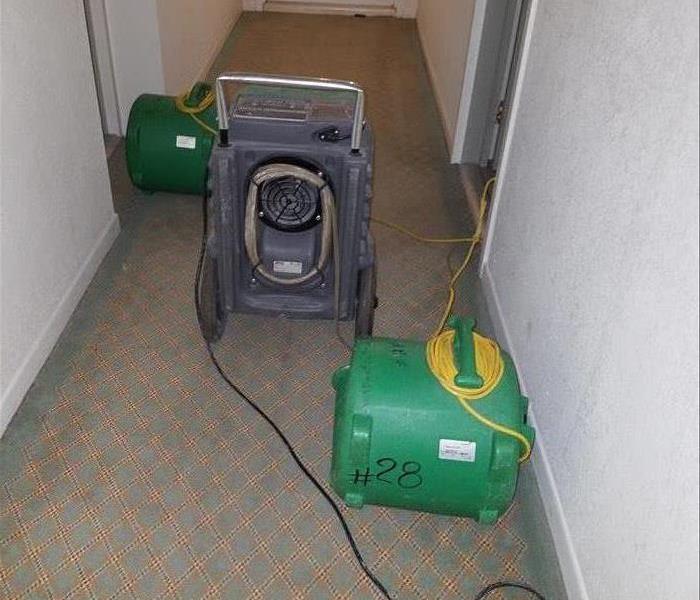Recent Storm Damage Posts
YOU'VE MADE IT THROUGH HURRICANE HELENE AND MILTON- NOW BE AWARE OF SCAMMERS
10/12/2024 (Permalink)
Florida is recovering from two back-to-back Hurricanes. Our hearts and prayers go out to all those affected and still recovering from the Hurricanes.SERVPRO Corporate made us aware of this, and I feel sharing this content is important.
"Scammers will frequently use high-profile events, such as natural disasters, to trick you. In the aftermath of Hurricane Helene and with Hurricane Milton on the horizon, scammers have wasted no time in turning this situation to their advantage. They've been using AI to generate fake images that play on your emotions to get you to donate money to help people affected by the disaster.
Recently, an image of a scared little girl holding a puppy and being evacuated from a flood area has been circulating on Facebook and other social media. However, this image is fake. The scammers are trying to trick you into clicking a link to "donate" to a fake relief effort or to steal your personal information. If you donate money or enter any personal information, it will not help any victims who were impacted by the hurricane. However, it will help the scammers steal your money and your data!"
SERVPRO of East Davie/Cooper City suggests following these tips to avoid falling victim to a hurricane scam:
. Make sure that the charity you’re donating to is legitimate.
. Only donate through the official websites of well-known charitable organizations.
. Don't act impulsively.
. Use sources like Our Security Partner, Knowbe4.com
As always, SERVPRO of East Davie/Cooper City is there for you in your time of need. Call 954-725-6400 or 954-741-4321.
Protecting Your Home and Business from Unlicensed Activity After a Storm
8/20/2024 (Permalink)
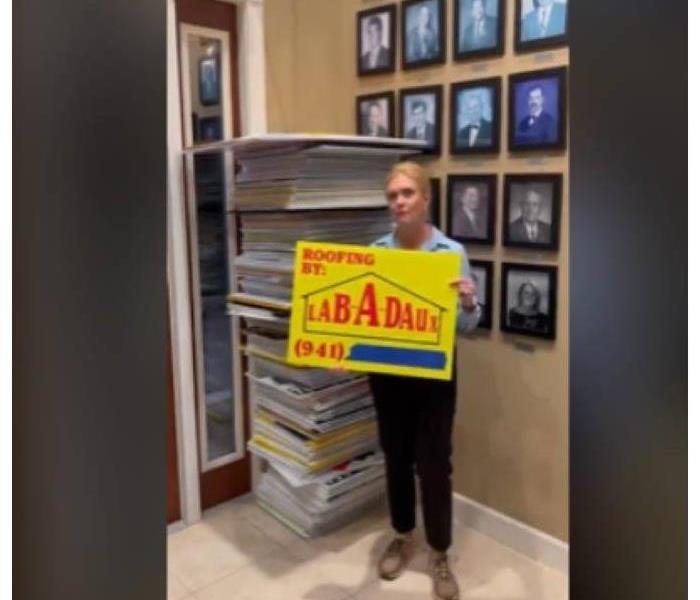 Over 6' tall pile of yard signs collected from unlicensed businesses after the storm in Naples, Florida.
Over 6' tall pile of yard signs collected from unlicensed businesses after the storm in Naples, Florida.
During the aftermath of a storm, unlicensed construction activity can occur. This occurs when a person not licensed or registered by the state performs or offers a job or service requiring licensure or registration. During a declared State of Emergency, the penalty for unlicensed construction activity is a third-degree felony.
Unlicensed contractors take advantage of homeowners. Some may travel from out of state to exploit Floridians living in a disaster area. It's important to know that even if the contractor is licensed in a different state, they must attain a license from the Florida Department of Business and Professional Regulation (DBPR) to perform repairs in Florida.
Here are steps to avoid becoming a victim of unlicensed activity after a storm.
* Understand which repair services require a State Contractors license.
* Always verify a contractor's license before signing a contract. Call DBPR customer service at 850-457-1395.
* Report any unlicensed activity by calling 866-532-1440.
* Avoid workers who say they "happen to be in the area".
* Ask for multiple opinions and written estimates.
* Avoid contractors who ask you to make your check payable to an individual instead of a company name. Do not pay in cash.
* Avoid contractors if they demand that you pay them in full before they make any repairs.
* Avoid contractors if they won't provide references for similar jobs in your area.
Owning and maintaining a home or business is one of the most significant investments you will make. Make sure you hire a contractor like SERVPRO of East Davie/Cooper City who can clean, restore, and reconstruct your property.
Storing our phone number 954-741-4321 in your phone now alleviates the stress of locating a trained, professional, licensed mold and restoration company that's also a licensed building contractor.
WATCH OUT FOR RED FLAGS AFTER HURRICANES
10/3/2023 (Permalink)
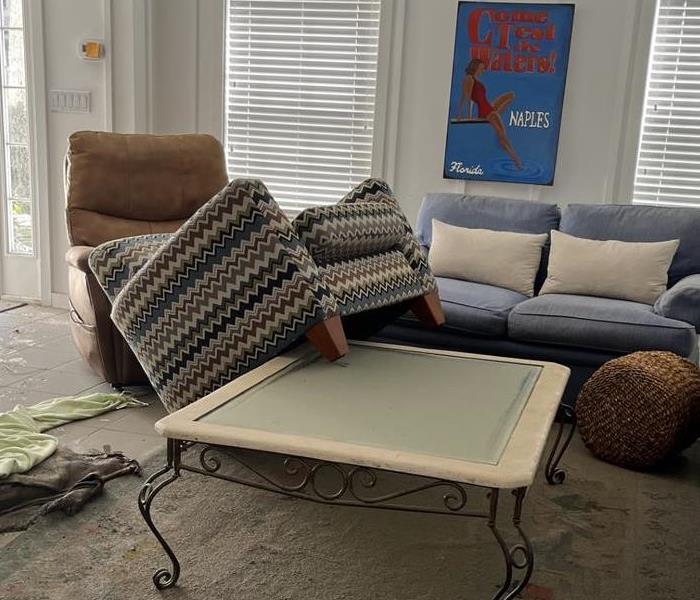 Verify the status of the contractor before hiring
Verify the status of the contractor before hiring
PROTECTING YOUR PROPERTY FROM UNLICENSED CONTRACTORS
Here's the scenario. Let's say you did everything right before a hurricane hit. You prepared and protected your family, home, or business. Some might have even had to evacuate to a shelter during the storm. After the storm, you start to assess the damages and need to hire a contractor. This part is critical. Protect yourself from further damage by verifying the status of the contractor you choose. The aftermath of a major storm can attract shady contractors seeking to take advantage of distressed homeowners. Watch out for these red flags when hiring a restoration contractor. ~ They happen to "be in the area" and have leftover material. ~ Their license or insurance information cannot be verified. ~ They demand that you pay in full before they make any repairs. ~ They won't provide references for similar jobs in your area. ~ They offer a large discount but don't state the total cost of the repair. Always verify the status of a contractor's license at www.myfloridalicense.com/dbpr
Hurricane Idalia Blasted Off the 2023 Hurricane Season
8/31/2023 (Permalink)
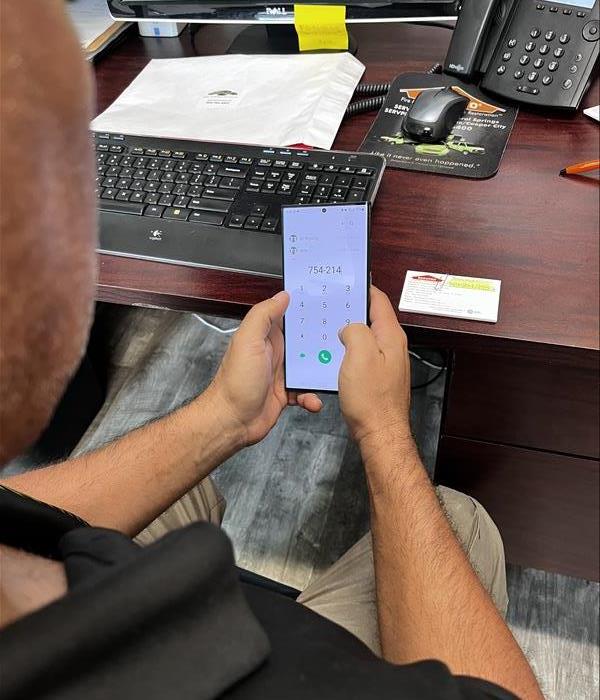 Now is the time to add SERVPRO'S phone number to the contacts of your phone
Now is the time to add SERVPRO'S phone number to the contacts of your phone
Hurricane Idalia has made us more aware of the ongoing hurricane season. It's important to be informed and prepared during this time.
Keep copies of your insurance information as well as SERVPRO of East Davie/Cooper City's phone number stored in your cell phone. This way if the power goes out you don't have to scramble around searching for these items.
Start gathering supplies like food, water, medicine, flashlights, batteries, baby supplies, pet supplies, paper goods, a first aid kit, and cash. Get gas in your cars and fill your BBQ propane tanks. Don't forget to charge your cell phones.
Just like we countdown 4 3 2 1 before a rocket launches, add 954-741-4321 SERVPRO of East Davie/Cooper City's phone number into the contacts of your phone. This way you can be reassured that you can get cleanup help immediately.
954-741-4321
PREPARING FOR THE UNEXPECTED DURING A STORM
9/2/2022 (Permalink)
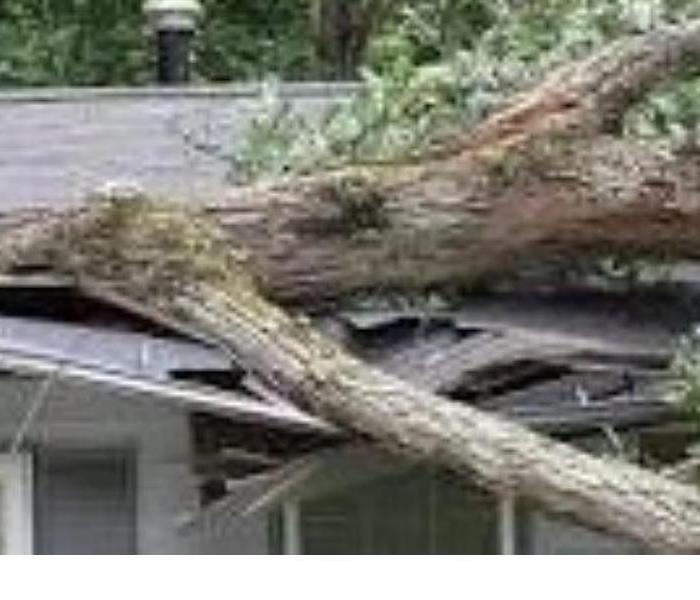 Having SERVPRO of East Davie/Cooper City's phone numbers stored in customer's phone-enabled quick restoration time.
Having SERVPRO of East Davie/Cooper City's phone numbers stored in customer's phone-enabled quick restoration time.
PREPARATION IS THE KEY
Preparing for storms by protecting your home and loved ones is the key to surviving a tropical storm. However certain damages like a tree falling on your house are not in your control. You need to be prepared for the unexpected. Add SERVPRO of East Davie/ Copper City's phone numbers into your cell phones now for those emergency situations.
When a tropical storm or hurricane hits an area hard there will inevitably be some structural and water damage that must be addressed immediately.
WE HAVE A 24/7 RESPONSE TEAM
SERVPRO of East Davie / Cooper City is always available for your water emergency. No house, commercial building, or job is too big for us to handle. Our technicians are trained to use our state-of-the-art equipment to ensure your job is done right, the first time.
Some of the most notable things that we are doing include:
- Water damage repair and restoration
- Storm damage repair and restoration
- Removing drywall in damaged areas
- Interior roof repairs
- Removing carpet and laminate in flooring that suffered flood damage
- Removing ceilings to deal with roof damage
- Repairing flooring with flood damage where everything from the ground up (2-4 feet) must be removed
After the storm hits, don't wait to mitigate. Call SERVPRO of East Davie/Cooper City.
954-741-4321 or 954-725-6400
STORM RESPONSE
8/2/2022 (Permalink)
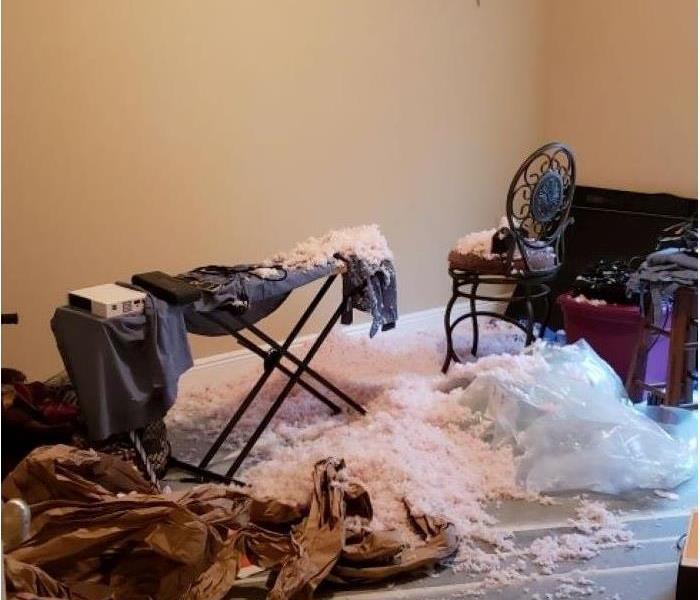 So much clean-up to do after the ceiling caves in following a storm.
So much clean-up to do after the ceiling caves in following a storm.
When a storm is a major event, you'll need more comprehensive restoration support and SERVPRO of East Davie/Cooper City can provide that for you. Knowing that fast mitigation is the key to getting you back in your home, we are experienced to give you the support needed during this devastating time. Customer satisfaction is our #1 priority.
We are dedicated to providing our customers with quality service 24/7, rain or shine!
WHAT TO DO AFTER A LOSS OCCURS
Protect your property from further damage by making reasonable and necessary repairs. Retain receipts of all expenses related to temporary repairs. Separate damaged property and keep it in a secure location. A Claims adjuster will need to examine all damaged property to fully estimate your loss.
Ultimately calling SERVPRO ASAP at 954-741-4321 or 954-725-6400 gives you a quicker response time getting your restoration completed.
PROTECT YOURSELF FROM UNLICENSED CONTRACTORS
The aftermath of a major storm can attract shady contractors seeking to take advantage of distressed homeowners. Watch out for these red flags when hiring a restoration contractor.
- If they are not affiliated with any recognized trade organization.
- Their license or insurance or information cannot be verified.
- They demand that you pay in full before they make any repairs.
- They won't provide references for jobs in your area.
Save yourself aggravation and headaches and choose SERVPRO of East Davie/Cooper City first and foremost. We have the right equipment. Our experienced tech knows the procedures and has the training to help ensure the structure is dry the first time, saving you time and money.
SERVPRO of East Davie/Cooper City:
954-741-4321 or 954-725-6400
Questions You Will Asked After Experiencing Storm Damage
5/25/2022 (Permalink)
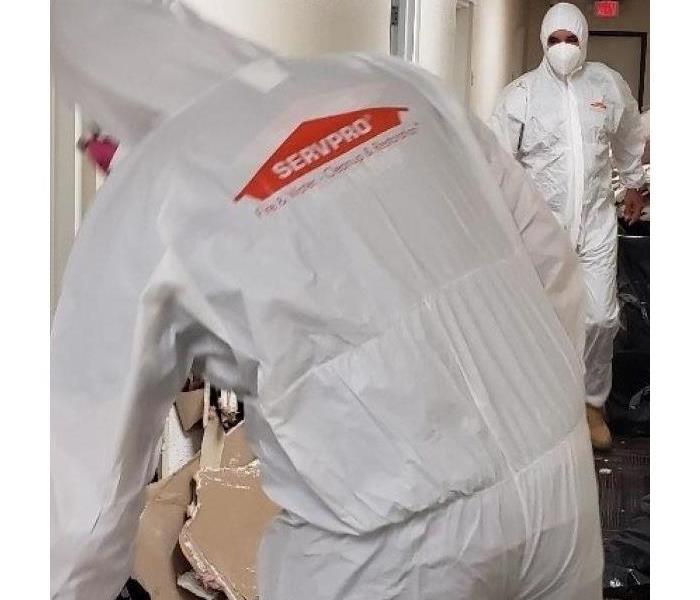 We've got your back at SERVPRO of East Davie/Cooper City and can restore your property quickly after experiencing damages from a storm
We've got your back at SERVPRO of East Davie/Cooper City and can restore your property quickly after experiencing damages from a storm
"To develop a team of quality people who focus on excellent service, fairness and mutual respect."-SERVPRO Mission Statement-
After a storm, your property might be in shambles. You may be feeling confused, stressed, and vulnerable. We've got your back and can expertly guide you through this crisis. SERVPRO of East Davie/Cooper City employs quality people with water damage training and experience to help you through this tough time. Our specific team of techs, that have the right experience, training and equipment can make your storm damage "Like it never even happened."
When you call, we will ask several questions regarding your water damage emergency. These questions will help us determine what equipment and resources to bring to your loss. A determination is also made as to how many experienced technicians will be needed.
You will be asked:
* Your name and contact information
* Your insurance information
* The address of the water-damaged home or business
* When did the flooding or water damage occur?
* What caused the water damage?
* Is the leak fixed/ water supply turned off/ is the water coming from the outside?
* Is there electricity available?
At SERVPRO of East Dave/Cooper City, we have your back and can help you get your property repaired as quickly as possible after a storm. Add our phone numbers to your cellphones for emergency situations.
954-741-4321 or 954-725-6400
Another Above Average Hurricane Season Predicted for 2022
4/22/2022 (Permalink)
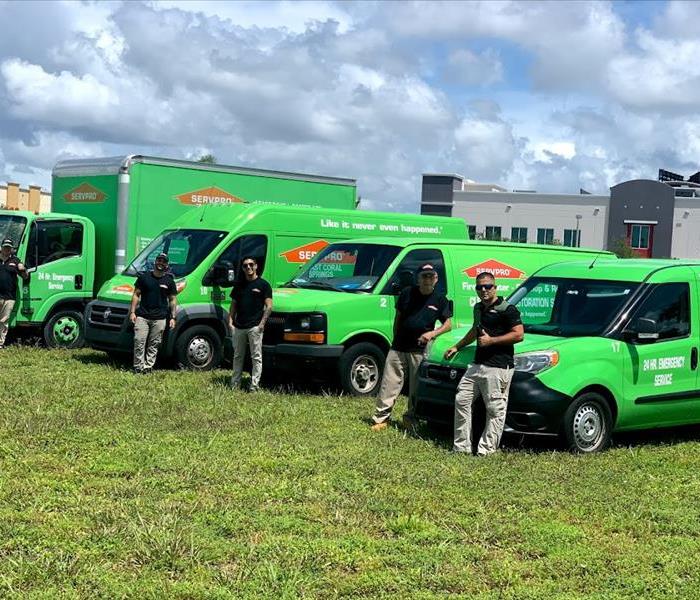 SERVPRO of East Davie and Cooper City technicians are ready to help the community with storm damages
SERVPRO of East Davie and Cooper City technicians are ready to help the community with storm damages
What is the hurricane prediction for 2022? Another above-average hurricane season is in the forecast for 2022. A prediction issued Thursday by scientists at Colorado State University says there will be at least 19 named storms and nine hurricanes — four of which will be Category 3 or higher.
These are the names for the 2022 Hurricane Season. Alex, Bonnie, Colin, Danielle, Earl, Fiona, Gaston, Hermine, Ian, Julia, Karl, Lisa, Martin, Nicole, Owen, Paula, Richard, Shary, Tobias, Virginie, and Walter.
Long-time Florida residents have the tendency to grow numb to the severity of hurricane season. The reality is that South Florida residents must take every storm seriously. History reminds us that things can change in an instant. We encourage homeowners to be vigilant and proactive in preparing for the 2022 Hurricane Storm season.
What's the best way to protect your property? Making a plan and thinking ahead about the "what if and what do I do" scenarios is critical. This is key to minimizing loss from storms. Now is the time to grab your cell phone and add our phone numbers as a new contact. 954-741-4321 and 954-725-6400.
Don't Forget to Protect Your Garage Door During Storm Season
4/6/2022 (Permalink)
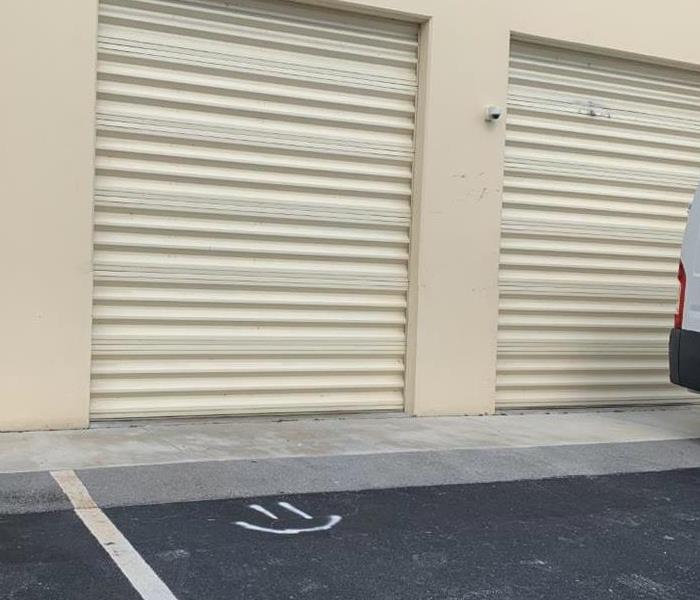 All garage doors, both residential and commercial, are vulnerable to storms if not protected correctly.
All garage doors, both residential and commercial, are vulnerable to storms if not protected correctly.
We are just two months away from the peak of storm season when tropical storms and hurricanes are popping up regularly.
Living in South Florida, with high temperatures and humidity, storms can be extremely dangerous. When planning to protect your home one of the most vulnerable areas is your garage. Your garage is susceptible to high winds and flooding. Here are a few tips to storm-proof your garage:
- When purchasing a garage door look for one with a high wind-resistance rating. If a storm with very strong winds or a tornado comes through and your garage door is breached the winds can batter your home. This can lead to water coming in and causing costly damage. For areas prone to tornadoes it is recommended that you invest in a garage door that can withstand 130 mph or higher winds.
- When installing your garage door consider installing a bracing system. This will reinforce the integrity of the door by anchoring the door to the walls and floors and into each hinge.
- Make sure to do proper maintenance to your garage door. Repair any breaches or holes that would allow wind to get through the garage door. Make sure to check the weather stripping and mechanisms for proper functionality.
- Do you have windows in your garage? Make sure they are secure and their weather-stripping is in proper condition. Having wrought-iron window protection also greatly helps in protecting the glass from flying debris.
- Install flood vents and proper drainage. You can have a trench drain installed to divert water, and flood vents inside the garage can drain water getting through before levels rise and cause damage.
At SERVPRO of East Dave/Cooper City, we believe in being prepared for any emergency. We suggest that you prepare by saving our phone numbers in the contact of your cell phone. This way, in case of an emergency, when you're dealing with a crisis and feeling overwhelmed, help is only a phone call away.
954-741-4321 or 954-725-6400
March is The Start of Rain Storms and Severe Weather
2/25/2022 (Permalink)
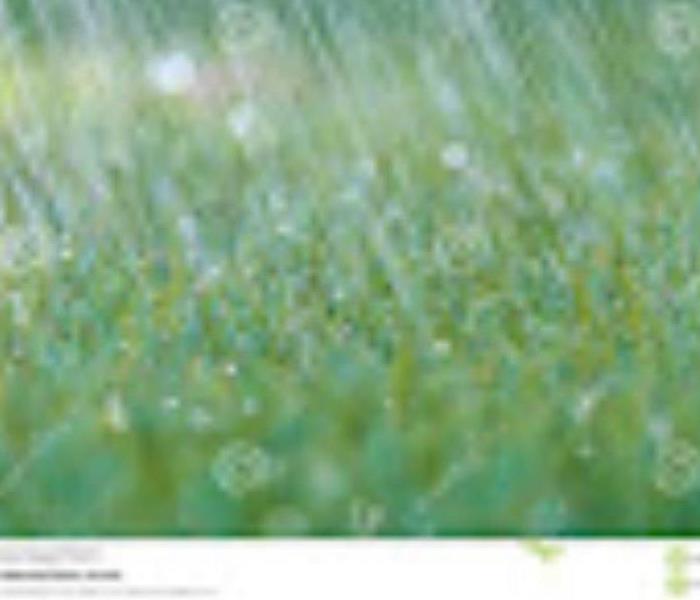 Severe rain storms start occurring in the month of March leading to possible flooding.
Severe rain storms start occurring in the month of March leading to possible flooding.
March marks the start of the spring severe weather and storm season. SERVPRO of East Davie/Cooper City believes that these three months of danger that can imperil the unprepared. Data published by the National Oceanic and Atmospheric Administration (NOAA) reveals that severe weather events are becoming more frequent and more devastating.
ARE YOU PREPARED? NOAA reported that last year alone (2021) delivered 20 “billion-dollar” weather or climate disaster events. It’s not unusual to see severe weather in the spring. Whenever you have warm, moist air colliding with cool, dry air, you have the conditions for creating a thunderstorm, along with the possibility of lightning strikes, floods, hail, high winds, rip currents, and even wildfires and tornadoes. The problem is, you can’t prevent these severe weather events and you can’t predict very far in advance when and where they will hit.
STEPS TO PREPARE The only sensible approach is to take steps in advance to protect your family and property, especially as these disasters become more common. SERVPRO of East Davie /Cooper City urges area home and business owners to check out state and federal resources online for tips on planning and preparing for a severe weather emergency now, as the spring severe weather season arrives. One resource is the National Center for Environmental Health of The Centers for Disease Control and Prevention (CDC), which offers suggestions for creating an emergency kit and preparing family members for severe weather emergencies at https://www.cdc.gov/nceh/features/springweather/index.html.
SERVPRO CAN HELP WITH STORM DAMAGE Each year, SERVPRO professionals across the country respond to scenes of weather-related mayhem, helping families and business owners recover from flooding, fire, wind damage and more. While we are standing by to help whenever we are needed, we hope that our neighbors in the area will heed this warning from the CDC and prepare for storms, floods, and tornadoes.
SERVPRO of East Davie/Cooper City specializes in disaster cleaning, restoration, and construction services. We help to remediate damage, making it “Like it never even happened,” for both commercial and residential customers. For more information on SERVPRO of East Davie/Cooper City at 954-741-4321 or 954-725-6400.
ROOFS AND STORM DAMAGE
1/25/2022 (Permalink)
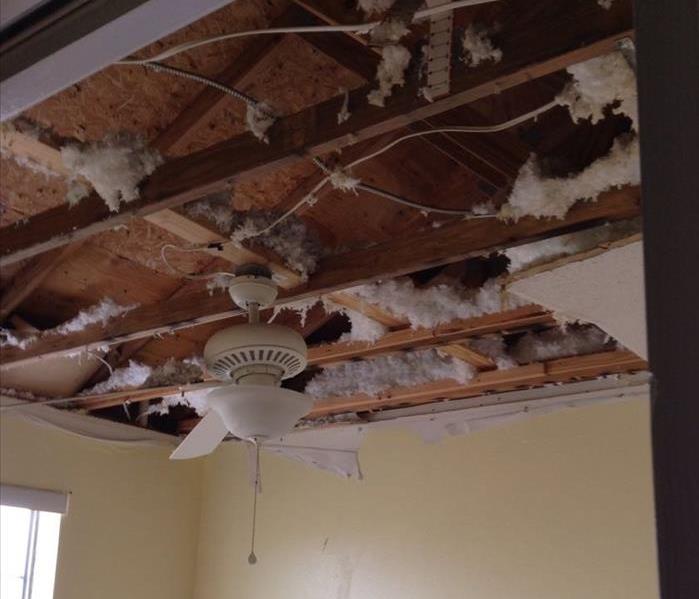 Home in upstate Florida had partial ceiling collapse from Hurricane Michael's storm.
Home in upstate Florida had partial ceiling collapse from Hurricane Michael's storm.
Living in South Florida, it's inevitable that you'll experience some type of storm damage. High winds, terrible rainstorms, and hurricanes are pretty common occurrences. All these add to the wear and tear of your roof, creating havoc on your home or business. Broken or loose roof tiles or shingles create more storm damage.
The roof is a key element of any structure and when it gets compromised, moisture can penetrate the structure causing wood and other building materials to be affected. Rotting, swelling, and warping start occurring. If these things happen, the ceiling will become compromised and then a whole list of problems can follow. Don't wait to mitigate, call us now.
SERVPRO of East Davie/Cooper City is on the Large Loss Emergency Hurricane Response Team. Because we are specially trained to handle any size storm issue, no job is too large or small for us.
ADD OUR PHONE NUMBER TO THE CONTACTS OF YOUR CELL PHONE
SERVPRO of East Davie/Cooper City always answers your call. Working 24/7/365, we help mitigate your emergency. Call us at 954-725-6400 or 954-741-4321 so we can get you back to where you were before the storm, "Like it never even happened."
Billions of Dollars in Storm Damages
1/20/2022 (Permalink)
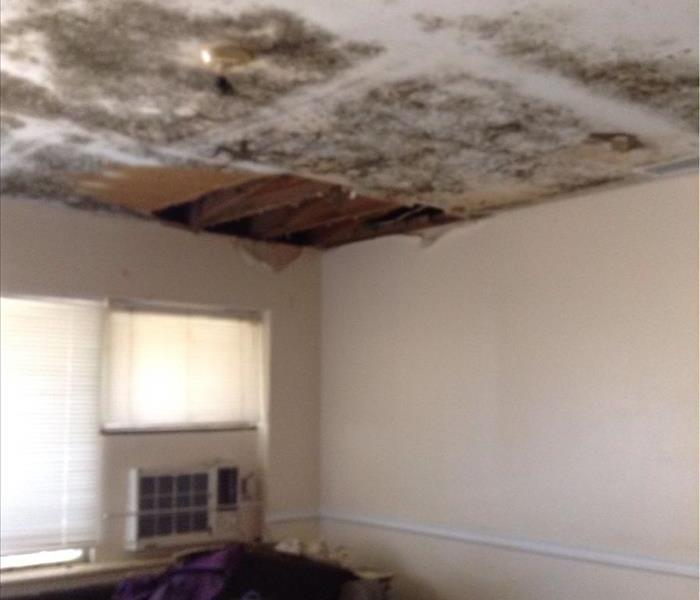 As part of the Hurricane Disaster Travel Team, SERVPRO of East Davie/Cooper City helps restore homes in Louisiana after Hurricane Ida.
As part of the Hurricane Disaster Travel Team, SERVPRO of East Davie/Cooper City helps restore homes in Louisiana after Hurricane Ida.
A recent report estimates that Hurricane Ida that hit Louisiana caused eighty-seven billion dollars of damages.
SERVPRO of East Davie/ Cooper City Is On The Hurricane Response Team
Sending our trained crew members to Louisiana for a month, we helped residents and businesses get their properties restored. It was a good feeling helping locals get back into their homes, and businesses back to doing business as usual. We understand that any day a homeowner is inconvenienced or a business is closed, is one day too many. SERVPRO’S goal is to minimize the disturbance to your property.
In a warming world, it’s expected that more tropical systems will feed off warmer water to undergo rapid intensification of strong winds. This means that East Davie and Cooper City Florida will feel the effects of severe storms and hurricanes in the future.
We Have The Experience
SERVPRO of East Davie/Cooper City technicians are on call 24 hours a day. We have the training and experience to respond to any size emergency you may have. When we arrive, we will assess the damage and begin the restoration process. If debris removal is required, we do that as well.
Call Us!!
We can help minimize the interruption to your life after a disaster. We answer 24/7/365. SERVPRO of East Davie/Cooper City (954)-725-6400. or 954-741-4321.
Helping in the Aftermath of Hurricane Ida
9/27/2021 (Permalink)
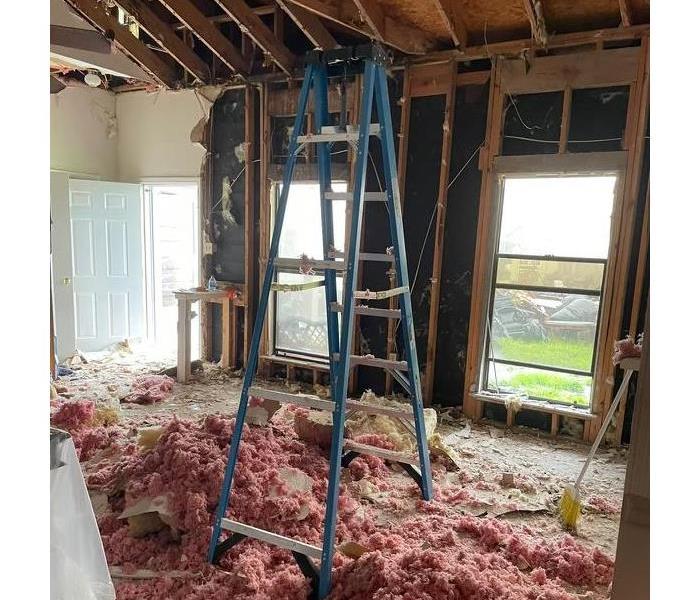 The Disaster Recovery Team of highly trained water restoration technicians worked diligently to get these homes back to their previous condition.
The Disaster Recovery Team of highly trained water restoration technicians worked diligently to get these homes back to their previous condition.
The state of Louisiana, and New Orleans in particular, is no stranger to destructive, intense hurricanes. Hurricane Ida hit the state as a Category 4 storm, destroying homes, infrastructure, and nature along the way. While the city bounces back fairly quickly, rural areas are still left with massive amounts of destruction and, in many cases, no power. Hurricane Ida came on strong with 150-mph winds and was responsible for more than 24 deaths throughout the state. When disaster strikes in cases like this, it is critical to have a team of support in a variety of capacities.
SERVPRO of East Davie / Cooper City acted quickly in our pursuit of lending a helping hand. When we arrived in New Orleans, we saw that there was a desperate need for water damage restoration and storm damage repairs. As usual, our team of damage restoration experts got to work immediately. The on-site team had to take down damage ceilings, remove most of the flooring, and cut through walls in order to dry the exterior.
In most cases, water damage had come in through the roof or window and was thus spreading rapidly – attacking the ceilings, walls, and floors. The Disaster Recovery Team of highly trained water restoration technicians worked diligently to get these homes back to their previous condition. As large-loss specialists, we were able to get to New Orleans in record time, assess the damage, and begin our restoration efforts.
When a catastrophic storm hits, devastation is inevitable. However, with our team on your side we are able to mitigate damage, repair quickly, and restore your home properly. While storms are unpredictable, you can always count on us to arrive with helping hands!
History’s Top 10 Largest Storms
8/4/2021 (Permalink)
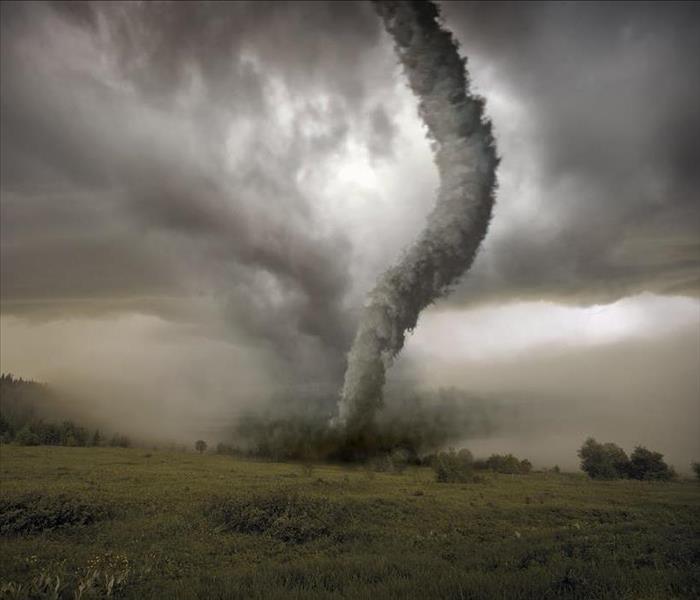 Throughout history we have seen some unbelievably massive storms.
Throughout history we have seen some unbelievably massive storms.
Long-time Florida residents have a tendency to grow numb to the severity of hurricane season in Florida. Having survived countless hurricanes and major storms, most Floridians look at Category 1 and Category 2 hurricanes as commonplace and nothing to worry too much about. The reality, however, is that South Florida residents must take every storm seriously. History reminds us that things can change in an instant and encourages homeowners to be vigilant and proactive in preparing for the worst and hoping for the best.
Throughout history we have seen some unbelievably massive storms. From cyclones and typhoons and from hurricanes to tropical storms, the destruction of past storms is not easily ignored. While movies showcase the threat of storms in a dramatic fashion, the truth is that some of history’s largest storms have truly had people running for their lives.
In the spirit of keeping everyone grounded and aware of the fact that major storms do exist, we have compiled a list of some of the biggest storms to ever hit earth. Our focus is usually on locations like Louisiana and Florida, but the entire globe has suffered at one point or another. The term we use most often, “hurricanes”, is actually only utilized in the Atlantic or Pacific Ocean. Whenever a storm hits in any other ocean it is referred to as a “typhoon”.
The following are some of the largest storms in the history of our planet:
- The Great Bhola Cyclone - Bangladesh
- Hurricane Liza - Mexico
- Hurricane Katrina - New Orleans
- Haiphong Typhoon - Gulf of Tonkin
- Vargas Tragedy – Venezuela
- Super Typhoon Nina - Hualien, China
- The Great Hurricane - Barbados
- Kavali Cyclone - Thailand
- Hugli River Cyclone - India
- Hong Kong Rainstorm Disasters - Hong Kong
The perfect combination of air pressure changes and water temperature can create extremely large and dangerous storms. The storms mentioned above accounted for tens of thousands of deaths. As we find ourselves approaching the peak of hurricane season soon, it is important to heed all warnings from the National Hurricane Center. Always err on the side of caution when it comes to hurricane preparation.
What Items Should I Keep in My House for Hurricane Season?
5/26/2021 (Permalink)
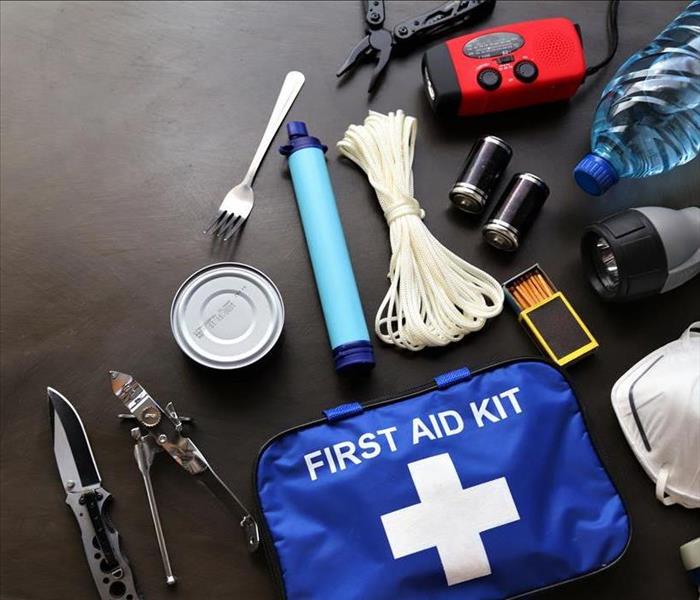 The earlier you can secure these hurricane items the better off you will be and can avoid a chaotic situation.
The earlier you can secure these hurricane items the better off you will be and can avoid a chaotic situation.
With hurricane season approaching in Florida, it is crucial to be prepared for any potential storms. Due to the high levels of panic that often ensue with the announcement of a hurricane brewing, many people rush out and buy as many supplies as possible, leaving the grocery store shelves wiped clean. Because of this, the earlier you can secure these items the better off you will be and can avoid a chaotic situation.
Additionally, a hurricane kit is important if you need to evacuate and need to grab essential items fast or if you’re unable to leave your house in the middle of the storm and lose power.
According to the National Hurricane Center, here are some of the most common items to keep in your house for hurricane season:
Essential Items:
- Bottled Water (as a general rule of thumb, you should have one gallon of water per person per day for at least three days, for both drinking and sanitation)
- Non-perishable food items (enough for at least three days)
- Cell phone with charges and extra battery
- First-aid kit
- Flashlight and extra batteries
- Battery-powered radio and extra batteries
- Personal hygiene items
- Moist towelettes and garbage bags for personal sanitation
- Water-proof container for valuables, cash, and important documents
- Lighter or matches
- Cooler and ice packs
- Can opener for non-perishable food items
- Whistle to signal for help
- Pet food and extra water (if applicable)
- Infant formula and extra diapers (if applicable)
Additional Recommended Items:
After all of the essentials are covered, it is recommended by experts at FEMA to also have these additional items on hand.
- Prescription medications and glasses
- Wrench or plies to turn off utilities
- Extra cash or checks
- Fire extinguisher
- Sleeping bags and/or a warm blanket for each person
- A complete change of clothes for each person
- Paper cups, plates, paper towels, and plastic utensils
- Games, books, puzzles, or other activities for children and entertainment
Maintaining and Storing Your Hurricane Kit
Once you have your hurricane preparedness kit in order, it is important to maintain it and update it each year as hurricane season approaches so it is ready as soon as you need it. To do this you should:
- Store any boxed food in tightly sealed metal or plastic containers
- Keep any canned food in a dry place
- Replace any expired items when necessary
- Keep your kit up to date and replace or update items as your family’s needs change
- Assign a designated place in your home for the kit and make sure all family members are aware of this spot and can easily grab it in case of an emergency.
Protecting Your Home After a Flood
3/8/2021 (Permalink)
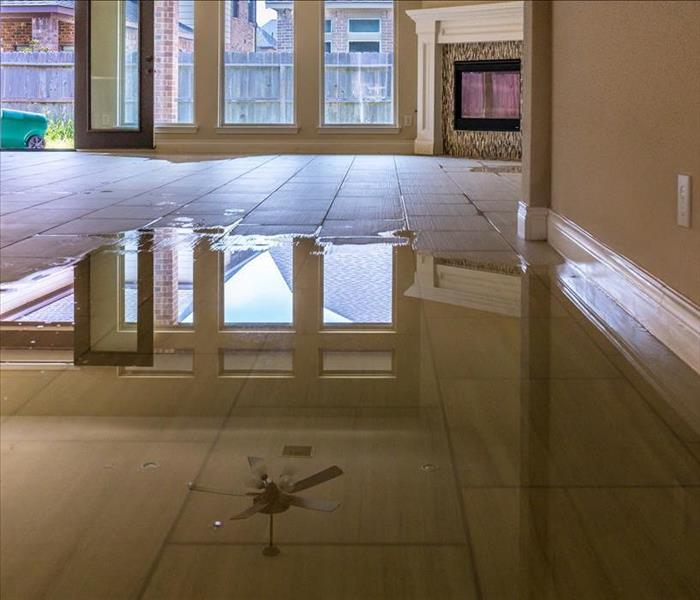 By knowing the best steps to protect your home after a flood, you and your loved ones can stay safe as you return to normal living conditions.
By knowing the best steps to protect your home after a flood, you and your loved ones can stay safe as you return to normal living conditions.
Even though cleaning up after a flood may seem like a formidable task, it is important to have a plan in place to tackle this undertaking. By knowing the best steps to protect your home after a flood, you and your loved ones can stay safe as you return to normal living conditions.
Prioritize Your Safety
Before you can start cleaning, it is important to first mitigate any safety hazards. There is a high chance that the water is contaminated, and the structure is unstable. To help prioritize your safety:
- Shut off gas and electricity before to the flooded area before entering the house.
- Examine the building’s structure by checking the foundation for any cracking and/or undermining in addition to the walls, floors, and windows.
- Have an electrician look over the electrical system.
- Wear appropriate clothing protection including rubber boots, waterproof gloves, and a safety mask, or googles.
- Have on hand a first aid kit for any minor injuries that occur.
Dealing with Insurance Claims
Before the cleaning process begins, there are steps you should take to make sure the insurance process can go as smooth as possible.
- Take pictures or videos of everything before you start cleaning! This is crucial for insurance claims and tax deductions.
- Record all of your expenses.
- Check in with your insurance company to see what their requirements are for a claim.
- Freeze any flooded books and papers before you have time to work with them. For the best chance of preservation, place waxed paper between the layers and place them inside plastic bags before going into a freezer.
The Cleanup Process
During the cleanup process, it is important to both cleaning and disinfect household items.
Step by Step Clean Up:
- Remove any standing water. While obvious, no cleaning can get done with standing water in the way. You can use pails or pumps to remove, and then use a wet/dry shop vacuum cleaner.
- Remove soaking wet and/or contaminated materials. Try to place things in large garbage bags and bring them outside the home. Depending on local regulations, something may need to be thrown out if it is contaminated with sewer water. Some larger furniture items may also be damaged beyond repair and need to be thrown out.
- Shovel out mud before it dries. While it may be treacherous, it is important to remove all of the mud and silt inside the house. A house may be used for this removal process.
- Clean and dry the walls. It is important to be fast, thorough, and safe in this process. Walls dry from the inside out and the interior parts of the walls must be thoroughly dried.
- Remove interior wall finishes to release water and mud from the cavities. Wall finishes that reach up to the high-water line should be thrown away.
- Remove all wall insulation that has been wet as it is contaminated.
- To remove mud, hose down the walls before they fully dry and disinfect them using some method of chlorine bleach.
- A moisture meter can be used to check the condition of the walls and when they are ready to re-insulate.
- Clean the floors and woodwork. Floors and other woodwork should be cleaned within 48 hours of the flood. It is very important to avoid any products that contain ammonia.
- For the cleaning process: Use plenty of hot water and scrub the floors with alkali solution (like washing soda). To disinfect, use a bleach solution such as a solution of 1/2 cup chlorine bleach to 1 gallon of water.
- Dry all of the surfaces. Heat and air should be used to surface dry materials within 24 to 48 hours. The continuous circulation of heat should reduce trying time and prevent the growth of any bacteria.
Experts recommend waiting about 6 months before the re-modeling process can begin. If your home has suffered flood damage, we are here to help. Contact our flood damage repair team today!
Hurricane Proof Your House During Off Season
12/17/2020 (Permalink)
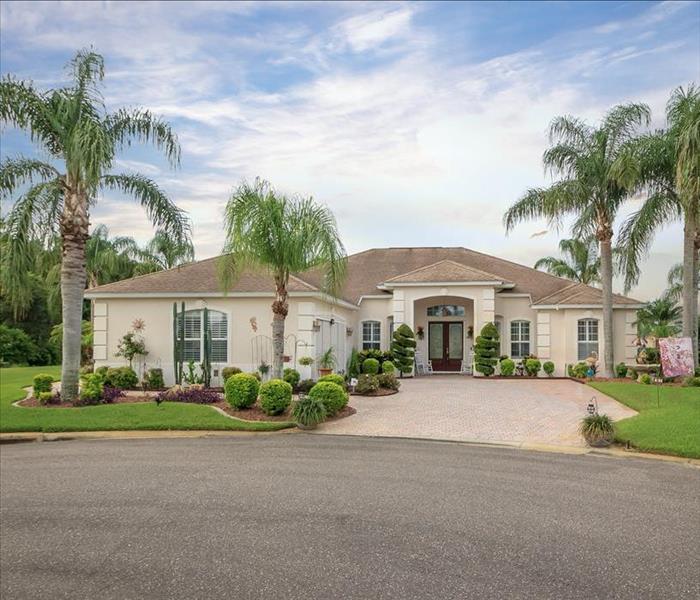 Do yourself and your family a favor and get on top of hurricane proofing your home sooner rather than later.
Do yourself and your family a favor and get on top of hurricane proofing your home sooner rather than later.
The winter months are some of the most incredible times to be a South Floridian. As temperatures drop and it seems like every day is a picture perfect day, it can be easy to forget about the rainy seasons. While most homeowners in South Florida spend the winter and spring months enjoying the weather outdoors as much as possible, the savviest of them will make a preparation game plan for the summer.
Hurricane season is very far away, but it is never too early to start planning and getting your home ready. In fact, many find that now is the perfect time to start thinking about getting the home in hurricane shape. From lower prices on items to the calm nature of preparing now, this is an ideal time to start thinking about how you want your home to look come hurricane season.
The following are some simple hurricane proofing tips that you can follow in the coming months:
- If you do not already have them, now is the time to get impact-resistant glass or shutters installed – pricing is usually lowest this time of year
- Take inventory of your landscaping and assess what needs to be fixed to minimize debris
- Check your garage door to ensure that it is installed properly and securely
- Go through your safety supplies – from bottled water to canned goods, now is the time to stock up
- Inspect your roof and check for any loose tiles
- Consider investing in a generator
- Check the surge protectors throughout your home and think about purchasing more
Taking the time to consider the above hurricane proofing tips now can save you time, money, and stress in the future. The calm of the winter and spring season means that prices for hurricane-related items are down. Do yourself and your family a favor and get on top of hurricane proofing your home sooner rather than later.
9 Facts About Thunderstorms
10/8/2020 (Permalink)
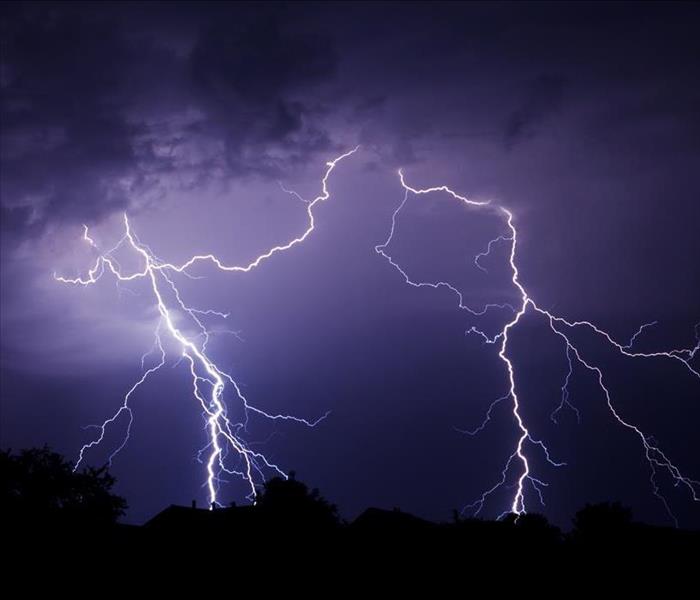 While no one can truly predict that severity of a storm, being knowledgeable about the potential damage that they can cause is imperative.
While no one can truly predict that severity of a storm, being knowledgeable about the potential damage that they can cause is imperative.
Florida weather is unlike the weather anywhere else in the world. One minute it could be beautiful and sunny and the next minute gray clouds could roll in and thunderstorms start booming. Thunderstorms in Florida can pass in 10 minutes or wreak havoc on an area for hours. The unpredictability that comes with South Florida storms makes it difficult to prepare and respond. The impact of thunderstorms ranges significantly, so Florida homeowners must take as many precautions as possible.
The fact that Floridians have grown so accustom to major thunderstorms is both a blessing and a curse. On one hand, being used to big storms reduces panic and makes the aftermath easier to deal with. On the other hand, the familiarity of thunderstorms can cause some Floridians to fail to act quickly and appropriately before a storm hits. In any case, being armed with facts is important for everyone. An educated person is in a much better position to weather a storm in Florida.
We have collected some of the most interested facts about thunderstorms below:
- Since light travels faster than sound, lighting is seen before thunder
- Snowstorms can cause thunder too
- The eye of a storm is very calm and can even be sunny
- A storm is pulled down by rain
- Approximately 6,000 lightning strikes occur each minute in a thunderstorm
- Astraphobia is the name for a fear of thunder and lightning
- A cumulus cloud weighs more than 1 million pounds
- On average, the temperature of lightning is 36,000 degrees Fahrenheit
- The way to calculate the distance that a storm is from you is to count the number of seconds between a flash of lightning and the sound of thunder (calculated as second divided by 5)
While no one can truly predict that severity of a storm, being knowledgeable about the potential damage that they can cause is imperative. At SERVPRO, our storm damage team has years of experience in repairing and restoring homes after a storm strikes. Contact us today to learn more!
Storm Damage Tips for Florida Residents
6/26/2020 (Permalink)
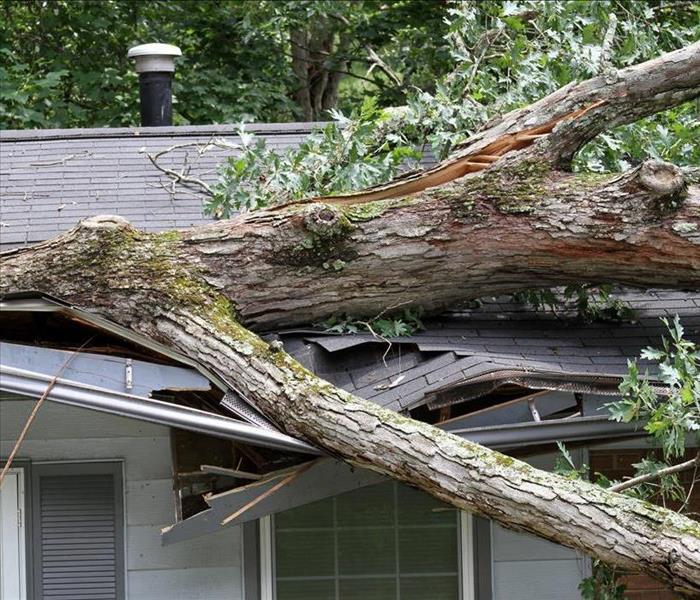 Even the most prepared homeowners can be shocked at the aftermath when a storm strikes.
Even the most prepared homeowners can be shocked at the aftermath when a storm strikes.
Living in Florida means growing accustom to heavy rains and unpredictable hurricanes. As we make our way into the heart of the summer season, it is more important than ever for Florida homeowners to be aware of the threat of storms and storm damage that can result. Hurricane season is tricky in the Sunshine State, since longtime residents tend to take them less seriously than they should. Being prepared, however, is by and far the best defense against a major storm or hurricane.
Safety is the most critical thing to be mindful of when a big storm is coming. Ensuring that your home and your family are well protected and prepared with things like non-perishable food items, bottled water, first aid kit, batteries, and flashlight is paramount. After you have made sure that your family is safe, however, it is also important to protect your home. The following are some important storm damage tips for Florida residents:
- Check your entire home for structural damage and be as thorough as possible.
- Take photos of any damage to your home, including your roof, both interior and exterior.
- Contact your insurance provider, those with a homeowner’s policy or a flood insurance policy may be covered for storm damage repairs.
- Be present during the inspection of your home with the adjuster.
- Do not do all of the storm damage repairs right away, as you should wait for a walk through with your insurance company. Only address essential repairs beforehand.
- Know the difference between a public adjuster, an insurance adjuster, and an insurance adjuster from your insurance company.
- Consider the Federal Disaster Loan Program.
- Contact storm damage repair and restoration professionals.
Even the most prepared homeowners can be shocked at the aftermath when a storm strikes. As such, it is important to be able to trust professionals following a major storm. At SERVPRO of East Davie/Cooper City, we are storm damage specialists dedicated to providing unmatched service to the members of our community. Call us today to learn more!
Natural Disasters
5/5/2020 (Permalink)
Floods are one of the most common natural disasters in North America, but not all floods are alike. Some develop gradually after days of slow, steady rain while others are flash floods resulting from a deluge of rain or dam failure. Homes in South Palm Beach and the surrounding areas are near sea level, making flooding more likely than in other areas.
Storms can cause severe damage to your home—potentially even making them unsafe! SERVPRO of East Davie/Cooper City is available 24 hours a day, seven days a week you can call us at (954) 741-4321 to get immediate help.
What You Should Do After a Flood
Even if you were properly prepared for the flood and weathered the storm until it passed, your home could still have sustained heavy damage. Now that the sky is blue once more, how do you proceed? Here’s a look at what to do after a flood:
Be Cautious
Just because the sun is shining and the flood waters have receded, that doesn’t mean all danger has passed. Exercise caution by doing the following:
- Tune into local alerts and warning systems to stay up-to-date with current information and receive expert, informed advice about the flood. After all, additional flooding could still occur.
- Stay away from rushing water. Moving water only 6 inches deep can sweep you off your feet.
- Avoid walking through large areas of standing water, which may be electrically charged by downed power lines. The water could also be hiding broken glass or dangerous animals.
- Unless you are specifically asked for help by the police, fire department, or relief workers, keep out of damaged areas.
- Help emergency workers by staying off the roads in and out of the damaged neighborhood or region.
- If you’re caught in a stalled car during a flash flood, abandon the car and get to higher ground immediately.
- Heed barricades and find an alternate route if you encounter one blocking your way. Crossing bridges even after the water has receded could be dangerous if the structural integrity has been jeopardized.
- Return home only when the authorities permit it. Even then, stay out of the building if it’s surrounded by flood waters and exercise extreme caution when you do enter.
Stay Safe and Healthy
Take care of you and your family as cleanup efforts begin. To stay safe and healthy, remember the following:
- Turn off the home’s electricity at the main breaker box, even if the power is out. Only turn the power on when your home is dry.
- Avoid floodwater, which may be contaminated with sewage, gasoline, or oil.
- Fix damaged sewer systems as soon as possible.
- Don’t drink water from the tap. Listen to news reports to learn when the community’s water is safe to drink again.
Clean and Repair Your Home
- Use the information in the Repairing Your Flooded Home PDF from the Red Cross to learn how to enter your home safely, protect your belongings from future damage, record damage for insurance claims, check for gas leaks, and begin the cleanup process.
- Contact your insurance agent to discuss your claim.
- Hire a professional water damage mitigation company as soon as possible. It’s important that the company is qualified for the services you need.
- SERPVRO of East Davie/Cooper City is available 24/7/365 to help when you need it most.
Call us @ 954-741-4321
Before the Storm
11/14/2019 (Permalink)
SERVPRO of East Davie/Cooper City wants our community to be prepared before a storm hits. Here are a few simple tips to follow:
Know where to go. If you are ordered to evacuate, know the local hurricane evacuation route(s) to take and have a plan for where you can stay. Contact your local emergency management agency for more information.
Put together a go-bag: disaster supply kit, including a flashlight, batteries, cash, first aid supplies, medications, and copies of your critical information if you need to evacuate
If you are not in an area that is advised to evacuate and you decide to stay in your home, plan for adequate supplies in case you lose power and water for several days and you are not able to leave due to flooding or blocked roads.
- Many communities have text or email alerting systems for emergency notifications. To find out what alerts are available in your area, search the Internet with your town, city, or county name and the word “alerts.”
- Cooper City has this one...Code Red Emergency Notification System
- Davie has this one....Notify Me
Be prepared before a Hurricane Strikes
11/14/2019 (Permalink)
Here area a few tips from SERVPRO of East Davie/Cooper City to prepare your home before a storm:
Hurricane winds can cause trees and branches to fall, so before hurricane season trim or remove damaged trees and limbs to keep you and your property safe.
Secure loose rain gutters and downspouts and clear any clogged areas or debris to prevent water damage to your property.
Reduce property damage by retrofitting to secure and reinforce the roof, windows and doors, including the garage doors.
Purchase a portable generator or install a generator for use during power outages. Remember to keep generators and other alternate power/heat sources outside, at least 20 feet away from windows and doors and protected from moisture; and NEVER try to power the house wiring by plugging a generator into a wall outlet
- Consider building a FEMA Safe Room or ICC 500 storm shelter designed for protection from high-winds and in locations above flooding levels.
- Add SERVPRO of East Davie/Cooper City to your cell phone @ 954-741-4321.
Remember...We are "Faster to any size disaster"
Tips for staying safe after a Flood
11/14/2019 (Permalink)
Floods are one of the most common natural disasters in North America, but not all floods are alike. Some develop gradually after days of slow, steady rain while others are flash floods resulting from a deluge of rain or dam failure. Homes in South Palm Beach and the surrounding areas are near sea level, making flooding more likely than in other areas.
Storms can cause severe damage to your home—potentially even making them unsafe! SERVPRO of East Davie/Cooper City is available 24 hours a day, seven days a week you can call us at (954) 741-4321 to get immediate help.
What You Should Do After a Flood
Even if you were properly prepared for the flood and weathered the storm until it passed, your home could still have sustained heavy damage. Now that the sky is blue once more, how do you proceed? Here’s a look at what to do after a flood:
Be Cautious
Just because the sun is shining and the flood waters have receded, that doesn’t mean all danger has passed. Exercise caution by doing the following:
- Tune into local alerts and warning systems to stay up-to-date with current information and receive expert, informed advice about the flood. After all, additional flooding could still occur.
- Stay away from rushing water. Moving water only 6 inches deep can sweep you off your feet.
- Avoid walking through large areas of standing water, which may be electrically charged by downed power lines. The water could also be hiding broken glass or dangerous animals.
- Unless you are specifically asked for help by the police, fire department, or relief workers, keep out of damaged areas.
- Help emergency workers by staying off the roads in and out of the damaged neighborhood or region.
- If you’re caught in a stalled car during a flash flood, abandon the car and get to higher ground immediately.
- Heed barricades and find an alternate route if you encounter one blocking your way. Crossing bridges even after the water has receded could be dangerous if the structural integrity has been jeopardized.
- Return home only when the authorities permit it. Even then, stay out of the building if it’s surrounded by flood waters and exercise extreme caution when you do enter.
Stay Safe and Healthy
Take care of you and your family as cleanup efforts begin. To stay safe and healthy, remember the following:
- Turn off the home’s electricity at the main breaker box, even if the power is out. Only turn the power on when your home is dry.
- Avoid floodwater, which may be contaminated with sewage, gasoline, or oil.
- Fix damaged sewer systems as soon as possible.
- Don’t drink water from the tap. Listen to news reports to learn when the community’s water is safe to drink again.
Clean and Repair Your Home
- Use the information in the Repairing Your Flooded Home PDF from the Red Cross to learn how to enter your home safely, protect your belongings from future damage, record damage for insurance claims, check for gas leaks, and begin the cleanup process.
- Contact your insurance agent to discuss your claim.
- Hire a professional water damage mitigation company as soon as possible. It’s important that the company is qualified for the services you need.
- SERPVRO of East Davie/Cooper City is available 24/7/365 to help when you need it most. Not only are we a local command center, but we also have the resources of 1,600 franchises nationwide—meaning no disaster is too big.
Call us @ 954-741-4321
Protect your HOme in Heavy Rain Storms
11/13/2019 (Permalink)
SERVPRO of East Davie/Cooper City wants to help you protect your home from heavy rain and floods.
One of the first things you should do to ensure that your home is prepared to cope with heavy rainfall is to clear your gutters of leaves and twigs that may have accumulated throughout the year, as a build-up of debris stops the flow of water to the drains and leads to overflowing.
If you live in an area that’s prone to heavy downpours, you need to make sure that any gaps or holes in the sealant surrounding your doors and windows are filled in. This will stop rain seeping in, and regular repairs will greatly reduce the impact of sealant erosion.
During heavy rain and the risk of possible floods, make sure that all electrical appliances are stored where water is unlikely to reach them. As we all know, water and electricity is never a good combination, so if your home has started to flood, don’t go near the fuse box and ensure that all sockets are covered and turned off.
Air vents are one of the most common ways that water finds its way into a house. If you know you’re in for some heavy rain, or are at risk of flooding, make sure that you cover these from both the outside and the inside with thick plastic sheeting.
Even with the utmost care of your property, disasters happen. SERVPRO of East Davie/Cooper City is here to assist you 24 hours a day 7 days a week. 954-741-4321
WE are here, when disaster strikes!
11/8/2019 (Permalink)
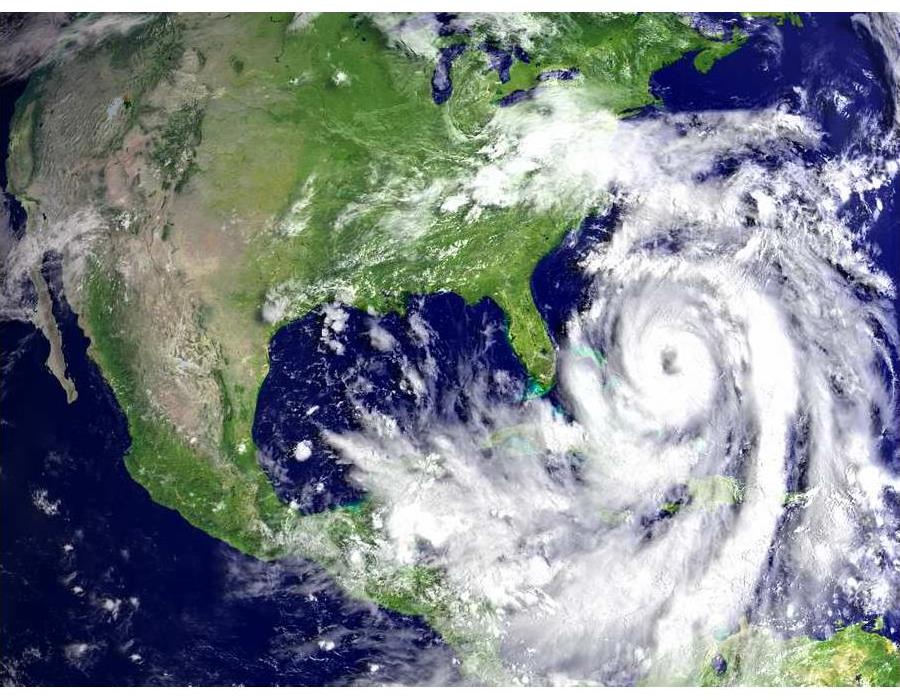 This is a Hurricane Photo as it approaches the state of Florida
This is a Hurricane Photo as it approaches the state of Florida
Locally Owned Company with National Resources
We live and work in East Davie/Cooper City too; we might even be neighbors. As a locally owned and operated business, SERVPRO of East Davie/Cooper City is close by and ready to respond to your emergency. We are proud to be an active member of the Ft. Lauderdale community and want to do our part to make our community the best it can be.
SERVPRO of East Davie/Cooper City specializes in storm and flood damage restoration. Our crews are highly trained and we use specialized equipment to restore your property to its pre-storm condition.
If you have damage to your home, call SERVPRO of East Davie/Cooper City at (954) 741-4321 to have all of your issues addressed appropriately and rapidly.
"Like it never even happened."
Staying Safe During a Tornado | SERVPRO® of East Davie/Cooper City
4/30/2019 (Permalink)
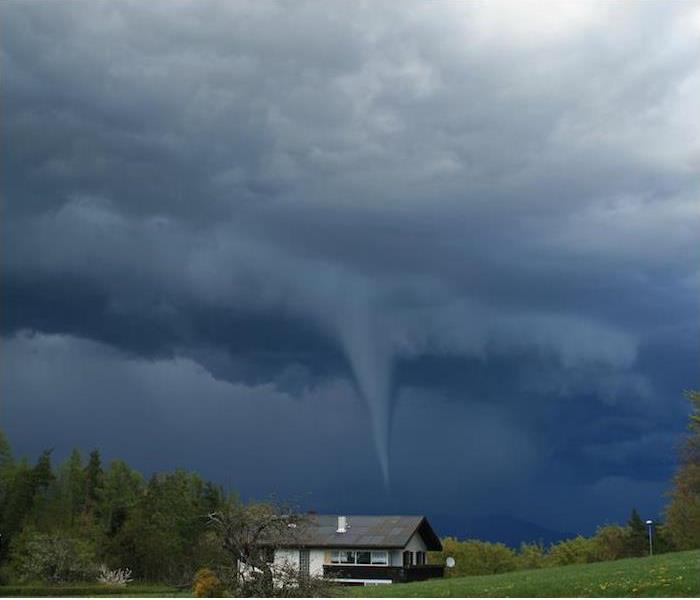 Tornado
Tornado
With springtime comes unpredictable weather—and knowing this means you should always be prepared for the chance of severe thunderstorms that lead to perfect conditions for tornadoes.
The months of April and May are known for the highest occurrences of tornadoes at 30% and 24% respectively, meaning we are currently in tornado season all throughout the United States.
That’s why we’d like to share some tips and information on tornadoes that can help keep your family prepared for the worst possible scenario.
Tornado Season ConditionsEach year in the United States, roughly 1,200 tornadoes occur, and they begin with severe thunderstorms, especially those known as “supercells.”
The formation of a tornado begins when changes in wind speed and direction create a horizontal spinning effect within a storm cell. This is then tipped vertical by rising air moving up through the thunderclouds.
You will, most likely not see the tornado’s signature funnel cloud at first as it is transparent, but the funnel will become visible as water droplets from the storm’s moist air condense or when dust and debris are picked up.
A typical tornado can grow to be 660 feet wide and will move at 10 to 20 miles per hour, although larger and faster ones have been observed. Hail and intense winds of more than 200 mph can accompany tornadoes.
We’ve already established that tornadoes typically occur in the spring and summertime. Late in the afternoon is when conditions become more favorable, but it is vital to remember that tornadoes can occur anytime and anywhere.
What You Should Do During a Tornado WarningDo you know the difference between a tornado watch and tornado warning? A watch is issued when the conditions are favorable for tornadoes, while a warning is issued when a tornado has been reported by spotters or indicated by radar.
If a warning has been issued for your area, seek a safe shelter immediately, especially if you are in the path of the tornado.
Shelter options include:
- Underground options like a basement or storm shelter.
- The lowest part of your home, in an area that is away from outside walls, doors and windows. Interior closets and bathrooms can be ideal options.
- If you are outside, try to get to a sturdy building. Mobile homes and trailers are not a safe option.
- If on the road and no building access is available, do not get under an overpass or bridge. Instead, find a low, flat location and use your arms to protect your head and neck.
It’s always a good idea to make sure that you have flashlights, a battery-powered weather radio and extra batteries stored in your selected tornado shelter at home.
If you find yourself caught out on the road during a tornado, DO NOT attempt to outrun it. Also, when you are taking shelter in your home, you can provide additional cover by using furniture items like couch cushions, mattresses or blankets to help keep your head and neck covered.
Tornadoes can be devastating on the areas where they touch down. While meteorologists and weather services can provide some advanced warning to potential threats, tornadoes can still occur with little to no warning at all.
If your home or business has been damaged by a tornado, know that SERVPRO® of East Davie/Cooper City is ready and waiting to jump into action and get cleanup and restoration of your property underway.
What You Should Know About Hurricanes And Tornadoes
12/19/2018 (Permalink)
Beware of Tornadoes during a Hurricane
Typically, tornadoes and hurricanes are thought of as separate storms, with tornadoes causing images of the flat prairie to come to mind, and hurricanes associated with coastal, warm tropics. Hurricanes are tremendously larger than tornadoes. However, Tornadoes can produce winds that are a lot faster than winds of hurricanes. Some tropical storms and hurricanes, however, can spin up tornadoes, as many have in the past. Just how do tropical storms and hurricanes make tornadoes?
Tropical storms and hurricanes are known collectively as tropical cyclones and have all the ingredients needed for make tornadoes. Most hurricanes can firstly carry with them individual supercells, which are well-organized, rotating thunderstorms. These storms are typically ones that spin up massive twisters in the Plains. Every tornado has to have a storm to form.
Hurricanes secondly bring with them moist, warm air, which acts as the fuel of these storms. These conditions make the atmosphere unstable, with namely a layer of warm air that is less moist and slightly colder than the air above it. All of this contributes to an unstable atmosphere since the warm air wants to rise, as it is not as dense.
Hurricanes finally create a wind shear, which is an abrupt change in the speed of the wind plus the direction of the wind over a short change in height. Rolls form from these alternating winds which are making swirling air. Then these vortices can be flipped vertically, which makes tornadoes, by updrafts from thunderstorms, which are currents of rising air that are warm.
A majority of hurricanes that move inland can cause tornadoes. It is rather uncommon not to have tornadoes with these storms, in fact. Tornadoes form mainly over land instead of water since the land slows down the winds which are at surface level, making, even more, wind shear. Tornadoes form anywhere these supercells that are already there happen to be, but meteorologists are not able to predict yet exactly where the tornadoes strike.
Usually created in the swirling bands of rain that is outside the cyclone, these twisters are found in the front-right quadrant of the storm. If the storm is moving north, in other words, you can likely find tornadoes to the northeast of the eye of the cyclone.
Tornadoes spawned from cyclones are not different fundamentally from other tornadoes which form in the Great Plains area. One difference, however, is that the former are usually less powerful, not exceeding a rating of EF2 for the most part on the Enhanced Fujita scale. Twisters which form in the Plains, secondly, get all of their components from different places. With hurricanes, however, they give all the elements needed for twisters on their own.
If one of these powerful storms has gone through your area, your property has likely sustained storm damage of some kind. Give our trained professionals at SERVPRO of East Davie/Cooper City a call so that we can come out quickly to assess and repair the damages. (954) 741-4321
Be Prepared Before A Storm Strikes
11/27/2018 (Permalink)
SERVPRO of East Davie/Cooper City wants our community to be prepared before a storm hits. Here are a few simple tips to follow:
Know where to go. If you are ordered to evacuate, know the local hurricane evacuation route(s) to take and have a plan for where you can stay. Contact your local emergency management agency for more information.
Put together a go-bag: disaster supply kit, including a flashlight, batteries, cash, first aid supplies, medications, and copies of your critical information if you need to evacuate
If you are not in an area that is advised to evacuate and you decide to stay in your home, plan for adequate supplies in case you lose power and water for several days and you are not able to leave due to flooding or blocked roads.
- Many communities have text or email alerting systems for emergency notifications. To find out what alerts are available in your area, search the Internet with your town, city, or county name and the word “alerts.”
Preparing Your Home Before A Storm Strikes
11/27/2018 (Permalink)
Here area a few tips from SERVPRO of East Davie/Cooper City to prepare your home before a storm:
Hurricane winds can cause trees and branches to fall, so before hurricane season trim or remove damaged trees and limbs to keep you and your property safe.
Secure loose rain gutters and downspouts and clear any clogged areas or debris to prevent water damage to your property.
Reduce property damage by retrofitting to secure and reinforce the roof, windows and doors, including the garage doors.
Purchase a portable generator or install a generator for use during power outages. Remember to keep generators and other alternate power/heat sources outside, at least 20 feet away from windows and doors and protected from moisture; and NEVER try to power the house wiring by plugging a generator into a wall outlet.
- Consider building a FEMA Safe Room or ICC 500 storm shelter designed for protection from high-winds and in locations above flooding levels.
Staying Safe After A Flood
11/27/2018 (Permalink)
Floods are one of the most common natural disasters in North America, but not all floods are alike. Some develop gradually after days of slow, steady rain while others are flash floods resulting from a deluge of rain or dam failure. Homes in South Palm Beach and the surrounding areas are near sea level, making flooding more likely than in other areas.
Storms can cause severe damage to your home—potentially even making them unsafe! SERVPRO of East Davie/Cooper City is available 24 hours a day, seven days a week you can call us at (954) 741-4321 to get immediate help.
What You Should Do After a Flood
Even if you were properly prepared for the flood and weathered the storm until it passed, your home could still have sustained heavy damage. Now that the sky is blue once more, how do you proceed? Here’s a look at what to do after a flood:
Be Cautious
Just because the sun is shining and the flood waters have receded, that doesn’t mean all danger has passed. Exercise caution by doing the following:
- Tune into local alerts and warning systems to stay up-to-date with current information and receive expert, informed advice about the flood. After all, additional flooding could still occur.
- Stay away from rushing water. Moving water only 6 inches deep can sweep you off your feet.
- Avoid walking through large areas of standing water, which may be electrically charged by downed power lines. The water could also be hiding broken glass or dangerous animals.
- Unless you are specifically asked for help by the police, fire department, or relief workers, keep out of damaged areas.
- Help emergency workers by staying off the roads in and out of the damaged neighborhood or region.
- If you’re caught in a stalled car during a flash flood, abandon the car and get to higher ground immediately.
- Heed barricades and find an alternate route if you encounter one blocking your way. Crossing bridges even after the water has receded could be dangerous if the structural integrity has been jeopardized.
- Return home only when the authorities permit it. Even then, stay out of the building if it’s surrounded by flood waters and exercise extreme caution when you do enter.
Stay Safe and Healthy
Take care of you and your family as cleanup efforts begin. To stay safe and healthy, remember the following:
- Turn off the home’s electricity at the main breaker box, even if the power is out. Only turn the power on when your home is dry.
- Avoid floodwater, which may be contaminated with sewage, gasoline, or oil.
- Fix damaged sewer systems as soon as possible.
- Don’t drink water from the tap. Listen to news reports to learn when the community’s water is safe to drink again.
Clean and Repair Your Home
- Use the information in the Repairing Your Flooded Home PDF from the Red Cross to learn how to enter your home safely, protect your belongings from future damage, record damage for insurance claims, check for gas leaks, and begin the cleanup process.
- Contact your insurance agent to discuss your claim.
- Hire a professional water damage mitigation company as soon as possible. It’s important that the company is qualified for the services you need. SERPVRO is available 24/7 to help when you need it most. Not only are we a local command center, but we also have the resources of 1,600 franchises nationwide—meaning no disaster is too big.
Protect Your Home in Heavy Rain Storms
11/20/2018 (Permalink)
SERVPRO of East Davie/Cooper City wants to help you protect your home from heavy rain and floods.
One of the first things you should do to ensure that your home is prepared to cope with heavy rainfall is to clear your gutters of leaves and twigs that may have accumulated throughout the year, as a build-up of debris stops the flow of water to the drains and leads to overflowing.
If you live in an area that’s prone to heavy downpours, you need to make sure that any gaps or holes in the sealant surrounding your doors and windows are filled in. This will stop rain seeping in, and regular repairs will greatly reduce the impact of sealant erosion.
During heavy rain and the risk of possible floods, make sure that all electrical appliances are stored where water is unlikely to reach them. As we all know, water and electricity is never a good combination, so if your home has started to flood, don’t go near the fuse box and ensure that all sockets are covered and turned off.
Air vents are one of the most common ways that water finds its way into a house. If you know you’re in for some heavy rain, or are at risk of flooding, make sure that you cover these from both the outside and the inside with thick plastic sheeting.
Even with the utmost care of your property, disasters happen. SERVPRO of East Davie/Cooper City is here to assist you 24 hours a day 7 days a week. 954-741-4321
When Disaster Strikes
11/14/2018 (Permalink)
Locally Owned Company with National Resources
We live and work in East Davie/Cooper City too; we might even be neighbors. As a locally owned and operated business, SERVPRO of East Davie/Cooper City is close by and ready to respond to your emergency. We are proud to be an active member of the Ft. Lauderdale community and want to do our part to make our community the best it can be.
SERVPRO of East Davie/Cooper City specializes in storm and flood damage restoration. Our crews are highly trained and we use specialized equipment to restore your property to its pre-storm condition.
If you have damage to your home, call SERVPRO of East Davie/Cooper City at (954) 741-4321 to have all of your issues addressed appropriately and rapidly.
"Like it never even happened".
Beware of Tornadoes During Hurricanes
12/20/2017 (Permalink)
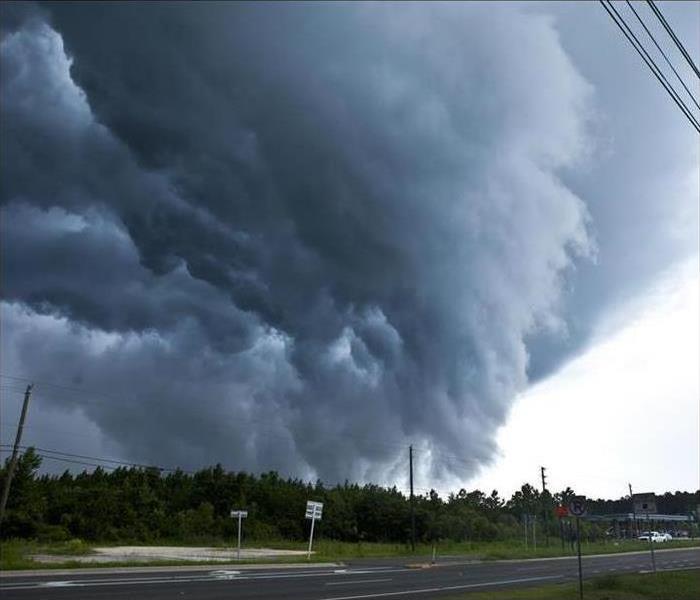 Intense Tornado
Intense Tornado
Beware of Tornadoes during a Hurricane
Typically, tornadoes and hurricanes are thought of as separate storms, with tornadoes causing images of the flat prairie to come to mind, and hurricanes associated with coastal, warm tropics. Hurricanes are tremendously larger than tornadoes. However, Tornadoes can produce winds that are a lot faster than winds of hurricanes. Some tropical storms and hurricanes, however, can spin up tornadoes, as many have in the past. Just how do tropical storms and hurricanes make tornadoes?
Tropical storms and hurricanes are known collectively as tropical cyclones and have all the ingredients needed for make tornadoes. Most hurricanes can firstly carry with them individual supercells, which are well-organized, rotating thunderstorms. These storms are typically ones that spin up massive twisters in the Plains. Every tornado has to have a storm to form.
Hurricanes secondly bring with them moist, warm air, which acts as the fuel of these storms. These conditions make the atmosphere unstable, with namely a layer of warm air that is less moist and slightly colder than the air above it. All of this contributes to an unstable atmosphere since the warm air wants to rise, as it is not as dense.
Hurricanes finally create a wind shear, which is an abrupt change in the speed of the wind plus the direction of the wind over a short change in height. Rolls form from these alternating winds which are making swirling air. Then these vortices can be flipped vertically, which makes tornadoes, by updrafts from thunderstorms, which are currents of rising air that are warm.
A majority of hurricanes that move inland can cause tornadoes. It is rather uncommon not to have tornadoes with these storms, in fact. Tornadoes form mainly over land instead of water since the land slows down the winds which are at surface level, making, even more, wind shear. Tornadoes form anywhere these supercells that are already there happen to be, but meteorologists are not able to predict yet exactly where the tornadoes strike.
Usually created in the swirling bands of rain that is outside the cyclone, these twisters are found in the front-right quadrant of the storm. If the storm is moving north, in other words, you can likely find tornadoes to the northeast of the eye of the cyclone.
Tornadoes spawned from cyclones are not different fundamentally from other tornadoes which form in the Great Plains area. One difference, however, is that the former are usually less powerful, not exceeding a rating of EF2 for the most part on the Enhanced Fujita scale. Twisters which form in the Plains, secondly, get all of their components from different places. With hurricanes, however, they give all the elements needed for twisters on their own.
If one of these powerful storms has gone through your area, your property has likely sustained storm damage of some kind. Give our trained professionals at SERVPRO of East Davie Cooper City a call so that we can come out quickly to assess and repair the damages. (954) 725-6400
Hurricane Prepareness Tips
11/28/2017 (Permalink)
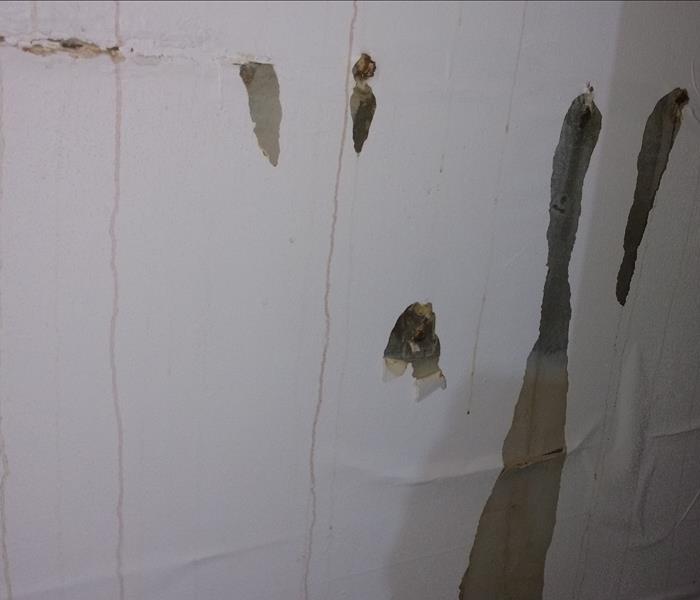 Be prepared for the Hurricane before it arrives.
This is damage caused by Hurricane Irma
Be prepared for the Hurricane before it arrives.
This is damage caused by Hurricane Irma
Know where to go. If you are ordered to evacuate, know the local hurricane evacuation route(s) to take and have a plan for where you can stay. Contact your local emergency management agency for more information.
Put together a go-bag: disaster supply kit, including a flashlight, batteries, cash, first aid supplies, medications, and copies of your critical information if you need to evacuate
If you are not in an area that is advised to evacuate and you decide to stay in your home, plan for adequate supplies in case you lose power and water for several days and you are not able to leave due to flooding or blocked roads.
- Many communities have text or email alerting systems for emergency notifications. To find out what alerts are available in your area, search the Internet with your town, city, or county name and the word “alerts.”
Preparing Your Home For A Hurricane
11/28/2017 (Permalink)
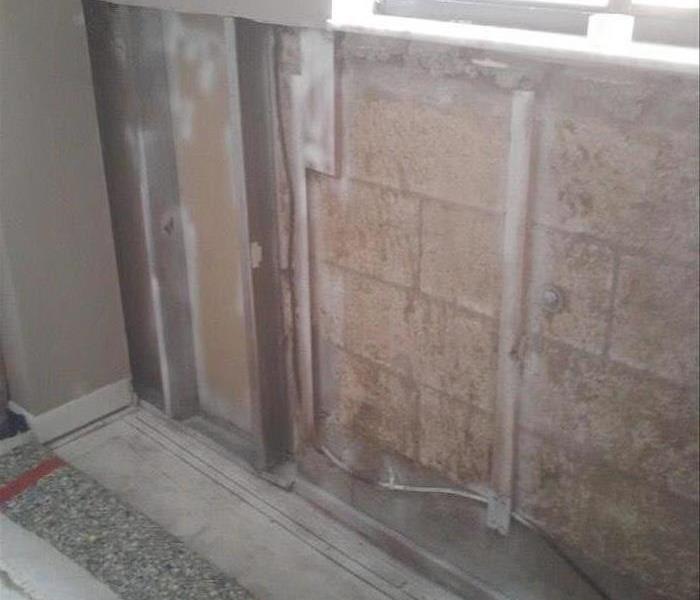 Make sure to have your home prepared before a hurricane strikes.
Make sure to have your home prepared before a hurricane strikes.
Hurricane winds can cause trees and branches to fall, so before hurricane season trim or remove damaged trees and limbs to keep you and your property safe.
Secure loose rain gutters and downspouts and clear any clogged areas or debris to prevent water damage to your property.
Reduce property damage by retrofitting to secure and reinforce the roof, windows and doors, including the garage doors.
Purchase a portable generator or install a generator for use during power outages. Remember to keep generators and other alternate power/heat sources outside, at least 20 feet away from windows and doors and protected from moisture; and NEVER try to power the house wiring by plugging a generator into a wall outlet.
- Consider building a Fema Safe Room or ICC 500 storm shelter designed for protection from high-winds and in locations above flooding levels.
What To Do After A Flood
11/28/2017 (Permalink)
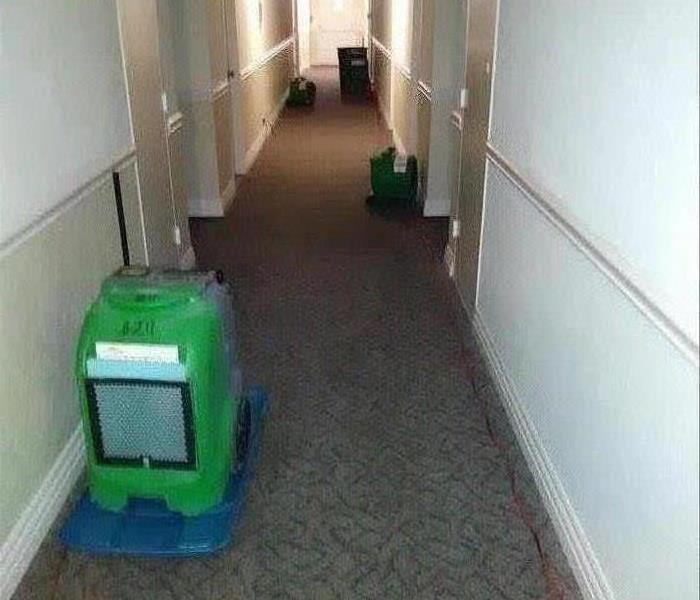 Make sure you know what to do after a flood to restore your home back to the way it was before the storm.
Make sure you know what to do after a flood to restore your home back to the way it was before the storm.
11/28/2017
Floods are one of the most common natural disasters in North America, but not all floods are alike. Some develop gradually after days of slow, steady rain while others are flash floods resulting from a deluge of rain or dam failure. Homes in South Palm Beach and the surrounding areas are near sea level, making flooding more likely than in other areas.
Storms can cause severe damage to your home—potentially even making them unsafe! SERVPRO is available 24 hours a day, seven days a week you can call us at (954) 725-6400 to get immediate help.
What You Should Do After a Flood
Even if you were properly prepared for the flood and weathered the storm until it passed, your home could still have sustained heavy damage. Now that the sky is blue once more, how do you proceed? Here’s a look at what to do after a flood:
Be Cautious
Just because the sun is shining and the flood waters have receded, that doesn’t mean all danger has passed. Exercise caution by doing the following:
- Tune into local alerts and warning systems to stay up-to-date with current information and receive expert, informed advice about the flood. After all, additional flooding could still occur.
- Stay away from rushing water. Moving water only 6 inches deep can sweep you off your feet.
- Avoid walking through large areas of standing water, which may be electrically charged by downed power lines. The water could also be hiding broken glass or dangerous animals.
- Unless you are specifically asked for help by the police, fire department, or relief workers, keep out of damaged areas.
- Help emergency workers by staying off the roads in and out of the damaged neighborhood or region.
- If you’re caught in a stalled car during a flash flood, abandon the car and get to higher ground immediately.
- Heed barricades and find an alternate route if you encounter one blocking your way. Crossing bridges even after the water has receded could be dangerous if the structural integrity has been jeopardized.
- Return home only when the authorities permit it. Even then, stay out of the building if it’s surrounded by flood waters and exercise extreme caution when you do enter.
Stay Safe and Healthy
Take care of you and your family as cleanup efforts begin. To stay safe and healthy, remember the following:
- Turn off the home’s electricity at the main breaker box, even if the power is out. Only turn the power on when your home is dry.
- Avoid floodwater, which may be contaminated with sewage, gasoline, or oil.
- Fix damaged sewer systems as soon as possible.
- Don’t drink water from the tap. Listen to news reports to learn when the community’s water is safe to drink again.
Clean and Repair Your Home
- Use the information in the Repairing Your Flooded Home PDF from the Red Cross to learn how to enter your home safely, protect your belongings from future damage, record damage for insurance claims, check for gas leaks, and begin the cleanup process.
- Contact your insurance agent to discuss your claim.
- Hire a professional water damage mitigation company as soon as possible. It’s important that the company is qualified for the services you need. SERPVRO is available 24/7 to help when you need it most. Not only are we a local command center, but we also have the resources of 1,600 franchises nationwide—meaning no disaster is too big.
Protecting your home from heavy rain during a storm
11/27/2017 (Permalink)
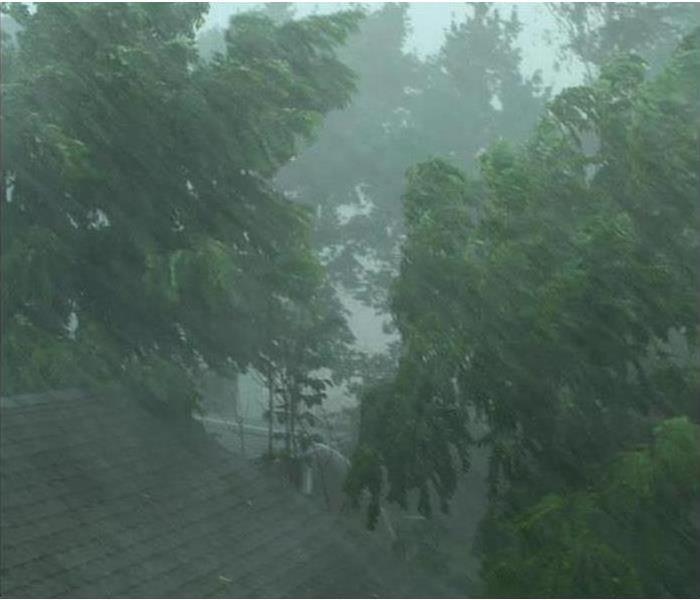 Make sure to protect your home during a storm from heavy rain.
Make sure to protect your home during a storm from heavy rain.
4 ways to protect your home from heavy rain and floods.
One of the first things you should do to ensure that your home is prepared to cope with heavy rainfall is to clear your gutters of leaves and twigs that may have accumulated throughout the year, as a build-up of debris stops the flow of water to the drains and leads to overflowing.
If you live in an area that’s prone to heavy downpours, you need to make sure that any gaps or holes in the sealant surrounding your doors and windows are filled in. This will stop rain seeping in, and regular repairs will greatly reduce the impact of sealant erosion.
During heavy rain and the risk of possible floods, make sure that all electrical appliances are stored where water is unlikely to reach them. As we all know, water and electricity is never a good combination, so if your home has started to flood, don’t go near the fuse box and ensure that all sockets are covered and turned off.
Air vents are one of the most common ways that water finds its way into a house. If you know you’re in for some heavy rain, or are at risk of flooding, make sure that you cover these from both the outside and the inside with thick plastic sheeting.
Hurricane Season 2018
11/17/2017 (Permalink)
Locally Owned Company with National Resources
We live and work in East Davie/Cooper City too; we might even be neighbors. As a locally owned and operated business, SERVPRO of East Davie/Cooper City is close by and ready to respond to your emergency. We are proud to be an active member of the Ft. Lauderdale community and want to do our part to make our community the best it can be.
SERVPRO of East Davie/Cooper City specializes in storm and flood damage restoration. Our crews are highly trained and we use specialized equipment to restore your property to its pre-storm condition.
If you have damages to your home, call SERVPRO of East Davie/Cooper City at (954) 741-4321 to have all of your issues addressed appropriately and rapidly.
"Like it never even happened".





 24/7 Emergency Service
24/7 Emergency Service
























